2021-2022学年人教版八年级英语下册Unit 5 What were you doing when the rainstorm came? 复习课件 (共39张PPT)
文档属性
| 名称 | 2021-2022学年人教版八年级英语下册Unit 5 What were you doing when the rainstorm came? 复习课件 (共39张PPT) | 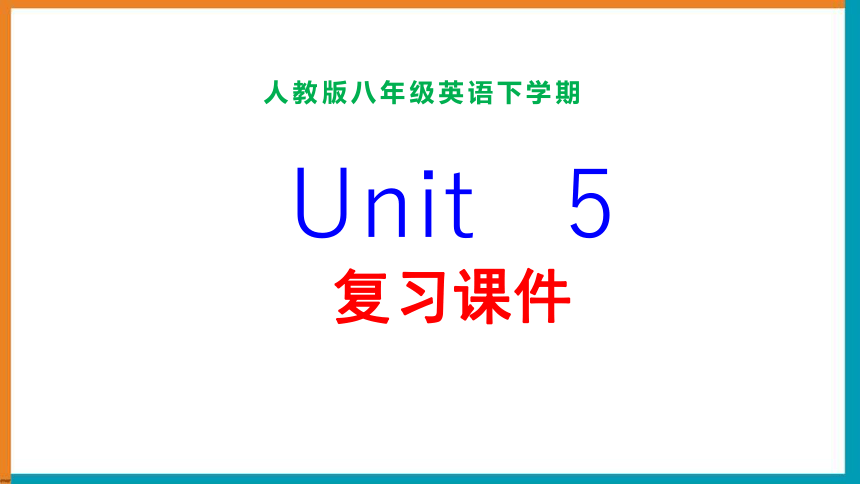 | |
| 格式 | pptx | ||
| 文件大小 | 965.7KB | ||
| 资源类型 | 教案 | ||
| 版本资源 | 人教新目标(Go for it)版 | ||
| 科目 | 英语 | ||
| 更新时间 | 2022-06-20 22:31:26 | ||
图片预览


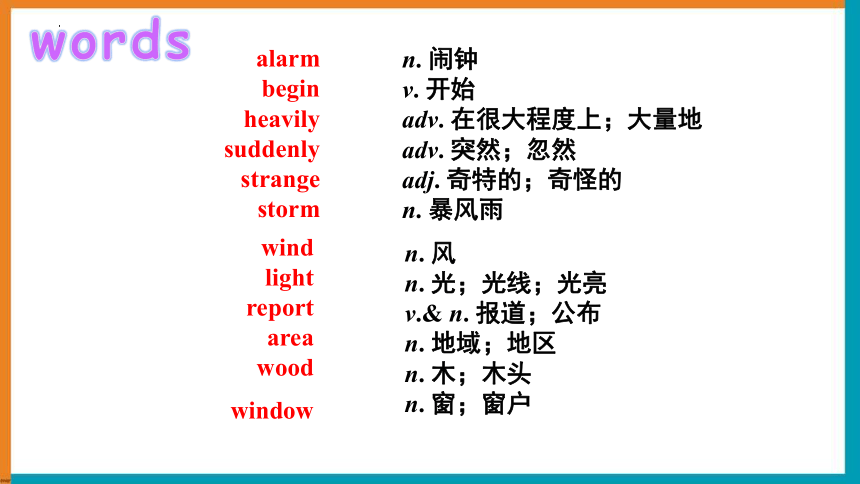
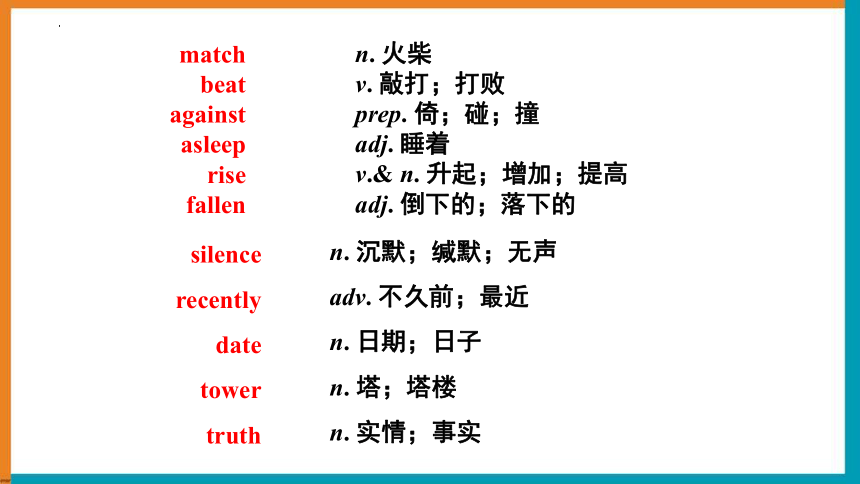

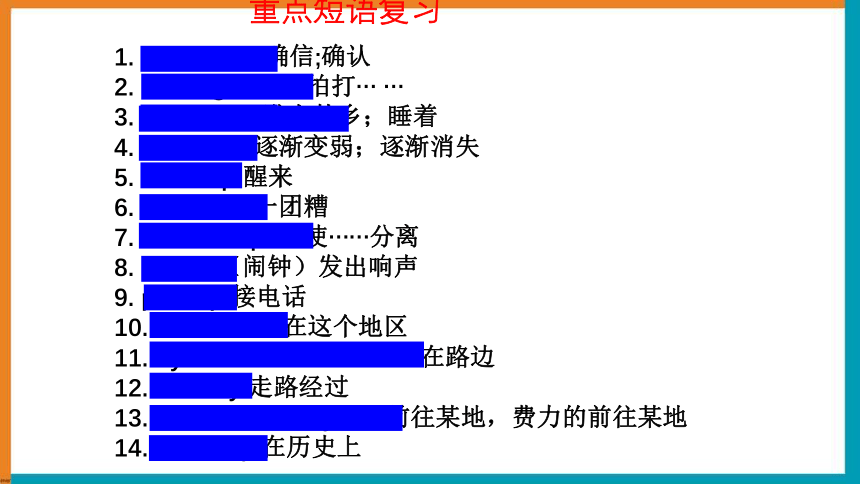
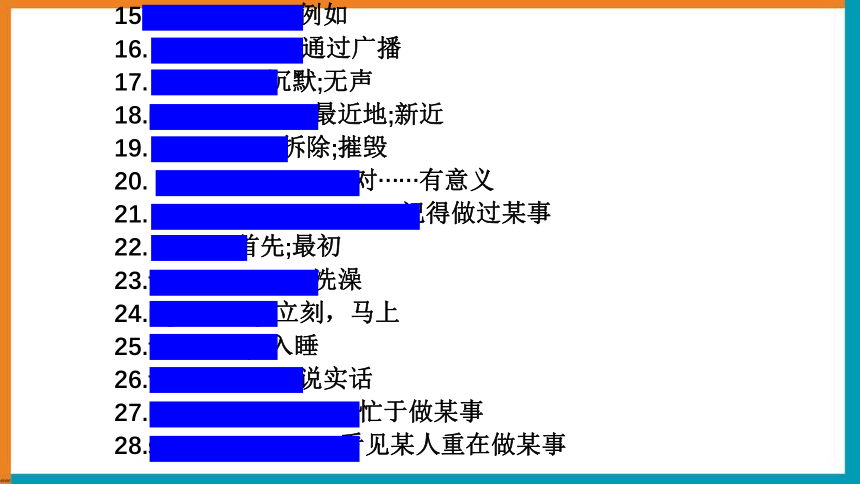

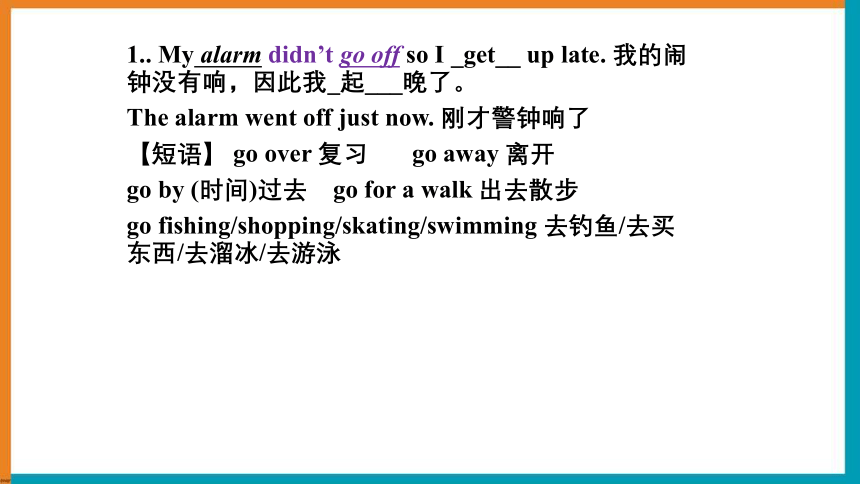
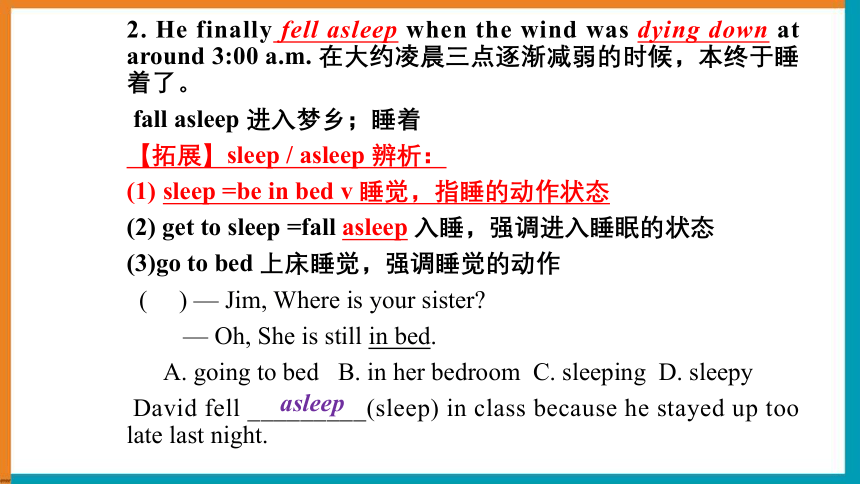
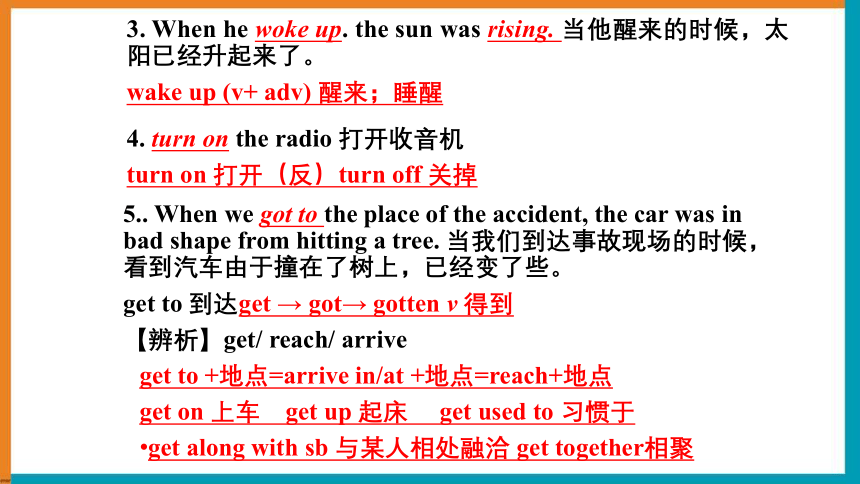
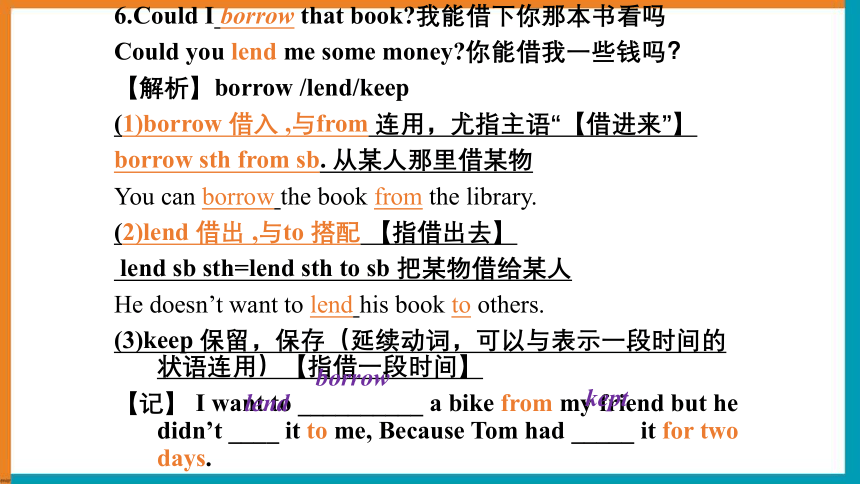
文档简介
(共39张PPT)
Unit 5
复习课件
人教版八年级英语下学期
重点词汇
n. 闹钟
v. 开始
adv. 在很大程度上;大量地
adv. 突然;忽然
adj. 奇特的;奇怪的
n. 暴风雨
alarm
begin
heavily
suddenly
strange
storm
words
n. 风
n. 光;光线;光亮
v.& n. 报道;公布
n. 地域;地区
n. 木;木头
n. 窗;窗户
wind
light
report
area
wood
window
n. 火柴
v. 敲打;打败
prep. 倚;碰;撞
adj. 睡着
v.& n. 升起;增加;提高
adj. 倒下的;落下的
match
beat
against
asleep
rise
fallen
n. 沉默;缄默;无声
adv. 不久前;最近
n. 日期;日子
n. 塔;塔楼
n. 实情;事实
silence
recently
date
tower
truth
adj. 覆盖着冰的;冰冷的
v. 开玩笑;欺骗
v. 理解;领会;认识到
n. 章节;段落
n. 学生
adv. 彻底地;完全地
icy
kid
realize
passage
pupil
completely
重点短语复习
1. make sure 确信;确认
2. beat against... 拍打… …
3. fall asleep 进人梦乡;睡着
4. die down 逐渐变弱;逐渐消失
5. wake up 醒来
6. in a mess 一团糟
7. break.. . apart 使……分离
8. go off (闹钟)发出响声
9. pick up 接电话
10. in the area 在这个地区
11. by the side of the road 在路边
12. walk by 走路经过
13. make one’s way to.. 前往某地,费力的前往某地
14.in history 在历史上
15. for example 例如
16. on the radio 通过广播
17. in silence 沉默;无声
18.more recently 最近地;新近
19. take down 拆除;摧毁
20. have meaning to 对……有意义
21. remember doing sth. 记得做过某事
22. at first 首先;最初
23.take a shower 洗澡
24.right away 立刻,马上
25.fall asleep 入睡
26.tell the truth 说实话
27.be busy doing sth 忙于做某事
28.see sb doing sth 看见某人重在做某事
重点句型
1.. My alarm didn’t go off so I _get__ up late. 我的闹钟没有响,因此我_起___晚了。
The alarm went off just now. 刚才警钟响了
【短语】 go over 复习 go away 离开
go by (时间)过去 go for a walk 出去散步
go fishing/shopping/skating/swimming 去钓鱼/去买东西/去溜冰/去游泳
2. He finally fell asleep when the wind was dying down at around 3:00 a.m. 在大约凌晨三点逐渐减弱的时候,本终于睡着了。
fall asleep 进入梦乡;睡着
【拓展】sleep / asleep 辨析:
sleep =be in bed v 睡觉,指睡的动作状态
(2) get to sleep =fall asleep 入睡,强调进入睡眠的状态
(3)go to bed 上床睡觉,强调睡觉的动作
( ) — Jim, Where is your sister
— Oh, She is still in bed.
A. going to bed B. in her bedroom C. sleeping D. sleepy
David fell _________(sleep) in class because he stayed up too late last night.
asleep
3. When he woke up. the sun was rising. 当他醒来的时候,太阳已经升起来了。
wake up (v+ adv) 醒来;睡醒
4. turn on the radio 打开收音机
turn on 打开(反)turn off 关掉
5.. When we got to the place of the accident, the car was in bad shape from hitting a tree. 当我们到达事故现场的时候,看到汽车由于撞在了树上,已经变了些。
get to 到达get → got→ gotten v 得到
【辨析】get/ reach/ arrive
get to +地点=arrive in/at +地点=reach+地点
get on 上车 get up 起床 get used to 习惯于
get along with sb 与某人相处融洽 get together相聚
6.Could I borrow that book 我能借下你那本书看吗
Could you lend me some money 你能借我一些钱吗?
【解析】borrow /lend/keep
(1)borrow 借入 ,与from 连用,尤指主语“【借进来”】
borrow sth from sb. 从某人那里借某物
You can borrow the book from the library.
(2)lend 借出 ,与to 搭配 【指借出去】
lend sb sth=lend sth to sb 把某物借给某人
He doesn’t want to lend his book to others.
(3)keep 保留,保存(延续动词,可以与表示一段时间的状语连用)【指借一段时间】
【记】 I want to __________ a bike from my friend but he didn’t ____ it to me, Because Tom had _____ it for two days.
borrow
lend
kept
I cut my finger and I’m trying not to get it wet.我的手指割伤了,伤口不能弄湿。
【解析】try (not) to do sth努力(不)做某事。
try v 试图,设法,努力
【拓展】 (1)try on 试穿
(2) try to do sth 努力做某事 【侧重尽力做】
(3) try doing sth 试图做某事 【侧重尝试做】
(4)try one’s best to do sth= do one’s best to do sth 尽某人最大努力做某事
7.They should spend their time on schoolwork in order to get good
grades and get into a good university.为了取得好成绩并考上一
好大学,他们应该把时间用在学习上。
【解析1】spend... on sth 在某事上花费....spend/pay/cost/take 花费
(1)spend→spent→spent v 花费,主语是人
◆ sb.+ spend +时间/钱+on sth
◆sb. +spend +时间/钱+(in)doing sth
◆spend on= pay for 支付
He spends too much time on the computer games.
(2) pay →paid →paid v 支付,主语是人◆sb.+ pay + 钱+for sth
I pay 10 yuan for the book.
(3) cost→ cost→ cost v 花费,主语是某物或某事
◆sth cost sb. +钱 某物花费某人多少钱
A new computer costs me a lot of money.
(4)take→took → taken v 花费
◆It takes /took sb. some time to do sth. 做某事花费某人多长时间
It takes him 3 hours to do his homework.
重点语法
过去进行时
过去进行时表示_____________或______ ________ 正在进行的动作。
一、概念
过去某一时刻
某一
时间内
二、构成
was/were+ 现在分词
三、基本句式
肯定句:主语 + was/were + 动词-ing + 其他
否定句:主语 + was/were + not + 动词-ing + 其他
一般疑问句:Was/ Were + 主语 + 动词-ing + 其他?
肯定回答:Yes, 主语 + was/ were.
否定回答:No, 主语 + wasn’t/ weren’t.
特殊疑问句:特殊疑问词 + was/were + 主语 +
动词-ing + 其他?
四、用法
1. 过去进行时表示过去某段时间内持续进行的动作。
常见的用于过去进行时的时间状语:this morning,
the whole morning, all day yesterday及when和while
引导的时间状语从句等。
2. 过去进行时可以表示在过去某个时间点发生的事
情,时间点可以用介词短语、副词或从句来表示。
3. 在复合句中,如果主句动作和从句动作都是延续
的或同时发生的,那么主句和从句的谓语动词都
可用过去进行时。
1. —Paul, what were you doing at nine last night
—I _____ a movie in the cinema with my friends.
A. was watching B. watch
C. have watched D. will watch
一、单项选择。
2. Mary ________ a math problem with her
classmates when the math teacher knocked at
the classroom door.
A. has discussed B. was discussed
C. was discussing D. discusses
3. —Why didn’t you answer my phone at nine
o’clock last night
—Sorry, I didn’t hear it. I ______ with my dog.
A. played B. was playing C. am playing
4. My father was watching TV while I ______ to the
radio.
A. listened B. was listening C. am listening
5. Newton(牛顿) was playing under an apple tree
______ an apple fell on his head.
A. until B. while C. when D. after
书面表达
01
02
03
三步五要素法写“事件类”作文
步骤一:确定写作内容要点
步骤三:发表个人的看法:
步骤二:叙述故事发生经过
时间
A
地点
B
事件
C
人们的评价
D
得到的启发
E
五要素
上周日在秦淮河边发生了张明救落水小男孩的事情,请根据以下四幅图所描述的事情经过,为校刊的英语园地写一篇题为“A Brave Young Man”的英文稿件。
注意:
1.文中不得出现真实姓名和学校名称;
2.语言通顺,意思连贯,条理清楚,书写规范;
3.词数80左右,文章的开头已经给出,不计入总词数。
A Brave Young Man
It was a nice day last Sunday.________________________________________________
______________________________________________________
范文:
A Brave Young Man
It was a nice day last Sunday. Zhang Ming was fishing by the Qinhuai River when a little boy went to play nearby. Suddenly, Zhang Ming heard someone shouting for help. He looked around and found that the little boy was falling into the water. It was very dangerous.Zhang Ming jumped into the river at once. He tried his best to pull the boy out of the river. At that time other people came to offer help. Finally the boy was saved and he was very grateful. People all said Zhang Ming was very brave and helpful. We should learn from him.
巩固练习
1. The boy heard the _________ (奇怪的) noise.
2. Yesterday’s ____________________(暴风雨)
was the heaviest one so far this year.
3. __________ (突然), the phone rang while I was
reading.
一、根据句意及汉语提示完成单词。
strange
rainstorm/ storm
Suddenly
4. The ________ (闹钟) can wake me up on time
every morning.
5. —When did you ______ (开始) to study English
—Seven years ago.
alarm
begin
6. What are the two events in the ________(章节)
7. He has bought a car _________ (最近).
8. Do you know the highest _________ (塔) in the
world
passage
recently
tower
9. Even the ________ (日期)—September 11,
2001—has great meaning to most Americans.
10. There are more than 1,000 ________ (学生) in
our school.
date
pupils
二、用所给单词的适当形式填空。
1. There are some _______(match) in the small box.
2. Don’t be angry and he’s only ________ (kid).
3. The roads are ___(ice) because of the heavy snow.
4. All ______ (area) of the country will have some
rain tonight.
5. The moon was _______(rise) when I went home.
matches
kidding
icy
areas
rising
6. —Why did you say that just now
—I ______________ (kid) at that time.
7. When I got home yesterday afternoon, it _____
_________ (rain) hard.
was kidding
was
raining
8. Mr.Wang with his daughter ______ (be) having
breakfast when someone knocked (敲) at the door.
9. —Hi, Carol. How was the trip to Disney World
—Hi, Alice. Oh, we ____ (have) a good time there.
10. The club members _____________ (dance) when
they heard a terrible noise outside.
was
had
were dancing
1. 这个事件对美国人而言具有特殊的含义。
(have special meaning to)
__________________________________________
三、根据汉语意思及括号内所给英文提示,将下列
句子翻译成英语。
The event has special meaning to American people.
2. 她什么也没说,只是默默地坐在那儿。
(in silence)
_________________________________________
3. 听到新闻后,所有人都震惊了。(be shocked)
_________________________________________
She didn’t say anything but sat there in silence.
After hearing the news, all people were shocked.
4. 昨天下午3点时,我正前往邮局。
(make one’s way)
_________________________________________
_________________________________________
5. 当我经过公园的时候,许多人正在那儿跳舞。
(when)
_________________________________________
_________________________________________
I was making my way to the post office at 3: 00
yesterday afternoon.
When I walked by the park, many people were
dancing there.
Unit 5
复习课件
人教版八年级英语下学期
重点词汇
n. 闹钟
v. 开始
adv. 在很大程度上;大量地
adv. 突然;忽然
adj. 奇特的;奇怪的
n. 暴风雨
alarm
begin
heavily
suddenly
strange
storm
words
n. 风
n. 光;光线;光亮
v.& n. 报道;公布
n. 地域;地区
n. 木;木头
n. 窗;窗户
wind
light
report
area
wood
window
n. 火柴
v. 敲打;打败
prep. 倚;碰;撞
adj. 睡着
v.& n. 升起;增加;提高
adj. 倒下的;落下的
match
beat
against
asleep
rise
fallen
n. 沉默;缄默;无声
adv. 不久前;最近
n. 日期;日子
n. 塔;塔楼
n. 实情;事实
silence
recently
date
tower
truth
adj. 覆盖着冰的;冰冷的
v. 开玩笑;欺骗
v. 理解;领会;认识到
n. 章节;段落
n. 学生
adv. 彻底地;完全地
icy
kid
realize
passage
pupil
completely
重点短语复习
1. make sure 确信;确认
2. beat against... 拍打… …
3. fall asleep 进人梦乡;睡着
4. die down 逐渐变弱;逐渐消失
5. wake up 醒来
6. in a mess 一团糟
7. break.. . apart 使……分离
8. go off (闹钟)发出响声
9. pick up 接电话
10. in the area 在这个地区
11. by the side of the road 在路边
12. walk by 走路经过
13. make one’s way to.. 前往某地,费力的前往某地
14.in history 在历史上
15. for example 例如
16. on the radio 通过广播
17. in silence 沉默;无声
18.more recently 最近地;新近
19. take down 拆除;摧毁
20. have meaning to 对……有意义
21. remember doing sth. 记得做过某事
22. at first 首先;最初
23.take a shower 洗澡
24.right away 立刻,马上
25.fall asleep 入睡
26.tell the truth 说实话
27.be busy doing sth 忙于做某事
28.see sb doing sth 看见某人重在做某事
重点句型
1.. My alarm didn’t go off so I _get__ up late. 我的闹钟没有响,因此我_起___晚了。
The alarm went off just now. 刚才警钟响了
【短语】 go over 复习 go away 离开
go by (时间)过去 go for a walk 出去散步
go fishing/shopping/skating/swimming 去钓鱼/去买东西/去溜冰/去游泳
2. He finally fell asleep when the wind was dying down at around 3:00 a.m. 在大约凌晨三点逐渐减弱的时候,本终于睡着了。
fall asleep 进入梦乡;睡着
【拓展】sleep / asleep 辨析:
sleep =be in bed v 睡觉,指睡的动作状态
(2) get to sleep =fall asleep 入睡,强调进入睡眠的状态
(3)go to bed 上床睡觉,强调睡觉的动作
( ) — Jim, Where is your sister
— Oh, She is still in bed.
A. going to bed B. in her bedroom C. sleeping D. sleepy
David fell _________(sleep) in class because he stayed up too late last night.
asleep
3. When he woke up. the sun was rising. 当他醒来的时候,太阳已经升起来了。
wake up (v+ adv) 醒来;睡醒
4. turn on the radio 打开收音机
turn on 打开(反)turn off 关掉
5.. When we got to the place of the accident, the car was in bad shape from hitting a tree. 当我们到达事故现场的时候,看到汽车由于撞在了树上,已经变了些。
get to 到达get → got→ gotten v 得到
【辨析】get/ reach/ arrive
get to +地点=arrive in/at +地点=reach+地点
get on 上车 get up 起床 get used to 习惯于
get along with sb 与某人相处融洽 get together相聚
6.Could I borrow that book 我能借下你那本书看吗
Could you lend me some money 你能借我一些钱吗?
【解析】borrow /lend/keep
(1)borrow 借入 ,与from 连用,尤指主语“【借进来”】
borrow sth from sb. 从某人那里借某物
You can borrow the book from the library.
(2)lend 借出 ,与to 搭配 【指借出去】
lend sb sth=lend sth to sb 把某物借给某人
He doesn’t want to lend his book to others.
(3)keep 保留,保存(延续动词,可以与表示一段时间的状语连用)【指借一段时间】
【记】 I want to __________ a bike from my friend but he didn’t ____ it to me, Because Tom had _____ it for two days.
borrow
lend
kept
I cut my finger and I’m trying not to get it wet.我的手指割伤了,伤口不能弄湿。
【解析】try (not) to do sth努力(不)做某事。
try v 试图,设法,努力
【拓展】 (1)try on 试穿
(2) try to do sth 努力做某事 【侧重尽力做】
(3) try doing sth 试图做某事 【侧重尝试做】
(4)try one’s best to do sth= do one’s best to do sth 尽某人最大努力做某事
7.They should spend their time on schoolwork in order to get good
grades and get into a good university.为了取得好成绩并考上一
好大学,他们应该把时间用在学习上。
【解析1】spend... on sth 在某事上花费....spend/pay/cost/take 花费
(1)spend→spent→spent v 花费,主语是人
◆ sb.+ spend +时间/钱+on sth
◆sb. +spend +时间/钱+(in)doing sth
◆spend on= pay for 支付
He spends too much time on the computer games.
(2) pay →paid →paid v 支付,主语是人◆sb.+ pay + 钱+for sth
I pay 10 yuan for the book.
(3) cost→ cost→ cost v 花费,主语是某物或某事
◆sth cost sb. +钱 某物花费某人多少钱
A new computer costs me a lot of money.
(4)take→took → taken v 花费
◆It takes /took sb. some time to do sth. 做某事花费某人多长时间
It takes him 3 hours to do his homework.
重点语法
过去进行时
过去进行时表示_____________或______ ________ 正在进行的动作。
一、概念
过去某一时刻
某一
时间内
二、构成
was/were+ 现在分词
三、基本句式
肯定句:主语 + was/were + 动词-ing + 其他
否定句:主语 + was/were + not + 动词-ing + 其他
一般疑问句:Was/ Were + 主语 + 动词-ing + 其他?
肯定回答:Yes, 主语 + was/ were.
否定回答:No, 主语 + wasn’t/ weren’t.
特殊疑问句:特殊疑问词 + was/were + 主语 +
动词-ing + 其他?
四、用法
1. 过去进行时表示过去某段时间内持续进行的动作。
常见的用于过去进行时的时间状语:this morning,
the whole morning, all day yesterday及when和while
引导的时间状语从句等。
2. 过去进行时可以表示在过去某个时间点发生的事
情,时间点可以用介词短语、副词或从句来表示。
3. 在复合句中,如果主句动作和从句动作都是延续
的或同时发生的,那么主句和从句的谓语动词都
可用过去进行时。
1. —Paul, what were you doing at nine last night
—I _____ a movie in the cinema with my friends.
A. was watching B. watch
C. have watched D. will watch
一、单项选择。
2. Mary ________ a math problem with her
classmates when the math teacher knocked at
the classroom door.
A. has discussed B. was discussed
C. was discussing D. discusses
3. —Why didn’t you answer my phone at nine
o’clock last night
—Sorry, I didn’t hear it. I ______ with my dog.
A. played B. was playing C. am playing
4. My father was watching TV while I ______ to the
radio.
A. listened B. was listening C. am listening
5. Newton(牛顿) was playing under an apple tree
______ an apple fell on his head.
A. until B. while C. when D. after
书面表达
01
02
03
三步五要素法写“事件类”作文
步骤一:确定写作内容要点
步骤三:发表个人的看法:
步骤二:叙述故事发生经过
时间
A
地点
B
事件
C
人们的评价
D
得到的启发
E
五要素
上周日在秦淮河边发生了张明救落水小男孩的事情,请根据以下四幅图所描述的事情经过,为校刊的英语园地写一篇题为“A Brave Young Man”的英文稿件。
注意:
1.文中不得出现真实姓名和学校名称;
2.语言通顺,意思连贯,条理清楚,书写规范;
3.词数80左右,文章的开头已经给出,不计入总词数。
A Brave Young Man
It was a nice day last Sunday.________________________________________________
______________________________________________________
范文:
A Brave Young Man
It was a nice day last Sunday. Zhang Ming was fishing by the Qinhuai River when a little boy went to play nearby. Suddenly, Zhang Ming heard someone shouting for help. He looked around and found that the little boy was falling into the water. It was very dangerous.Zhang Ming jumped into the river at once. He tried his best to pull the boy out of the river. At that time other people came to offer help. Finally the boy was saved and he was very grateful. People all said Zhang Ming was very brave and helpful. We should learn from him.
巩固练习
1. The boy heard the _________ (奇怪的) noise.
2. Yesterday’s ____________________(暴风雨)
was the heaviest one so far this year.
3. __________ (突然), the phone rang while I was
reading.
一、根据句意及汉语提示完成单词。
strange
rainstorm/ storm
Suddenly
4. The ________ (闹钟) can wake me up on time
every morning.
5. —When did you ______ (开始) to study English
—Seven years ago.
alarm
begin
6. What are the two events in the ________(章节)
7. He has bought a car _________ (最近).
8. Do you know the highest _________ (塔) in the
world
passage
recently
tower
9. Even the ________ (日期)—September 11,
2001—has great meaning to most Americans.
10. There are more than 1,000 ________ (学生) in
our school.
date
pupils
二、用所给单词的适当形式填空。
1. There are some _______(match) in the small box.
2. Don’t be angry and he’s only ________ (kid).
3. The roads are ___(ice) because of the heavy snow.
4. All ______ (area) of the country will have some
rain tonight.
5. The moon was _______(rise) when I went home.
matches
kidding
icy
areas
rising
6. —Why did you say that just now
—I ______________ (kid) at that time.
7. When I got home yesterday afternoon, it _____
_________ (rain) hard.
was kidding
was
raining
8. Mr.Wang with his daughter ______ (be) having
breakfast when someone knocked (敲) at the door.
9. —Hi, Carol. How was the trip to Disney World
—Hi, Alice. Oh, we ____ (have) a good time there.
10. The club members _____________ (dance) when
they heard a terrible noise outside.
was
had
were dancing
1. 这个事件对美国人而言具有特殊的含义。
(have special meaning to)
__________________________________________
三、根据汉语意思及括号内所给英文提示,将下列
句子翻译成英语。
The event has special meaning to American people.
2. 她什么也没说,只是默默地坐在那儿。
(in silence)
_________________________________________
3. 听到新闻后,所有人都震惊了。(be shocked)
_________________________________________
She didn’t say anything but sat there in silence.
After hearing the news, all people were shocked.
4. 昨天下午3点时,我正前往邮局。
(make one’s way)
_________________________________________
_________________________________________
5. 当我经过公园的时候,许多人正在那儿跳舞。
(when)
_________________________________________
_________________________________________
I was making my way to the post office at 3: 00
yesterday afternoon.
When I walked by the park, many people were
dancing there.
同课章节目录
- Unit 1 What's the matter?
- Section A
- Section B
- Unit 2 I'll help to clean up the city parks.
- Section A
- Section B
- Unit 3 Could you please clean your room?
- Section A
- Section B
- Unit 4 Why don't you talk to your parents?
- Section A
- Section B
- Unit 5 What were you doing when the rainstorm came
- Section A
- Section B
- Review of Units 1-5
- Unit 6 An old man tried to move the mountains.
- Section A
- Section B
- Unit 7 What's the highest mountain in the world?
- Section A
- Section B
- Unit 8 Have you read Treasure Island yet?
- Section A
- Section B
- Unit 9 Have you ever been to a museum?
- Section A
- Section B
- Unit 10 I've had this bike for three years.
- Section A
- Section B
